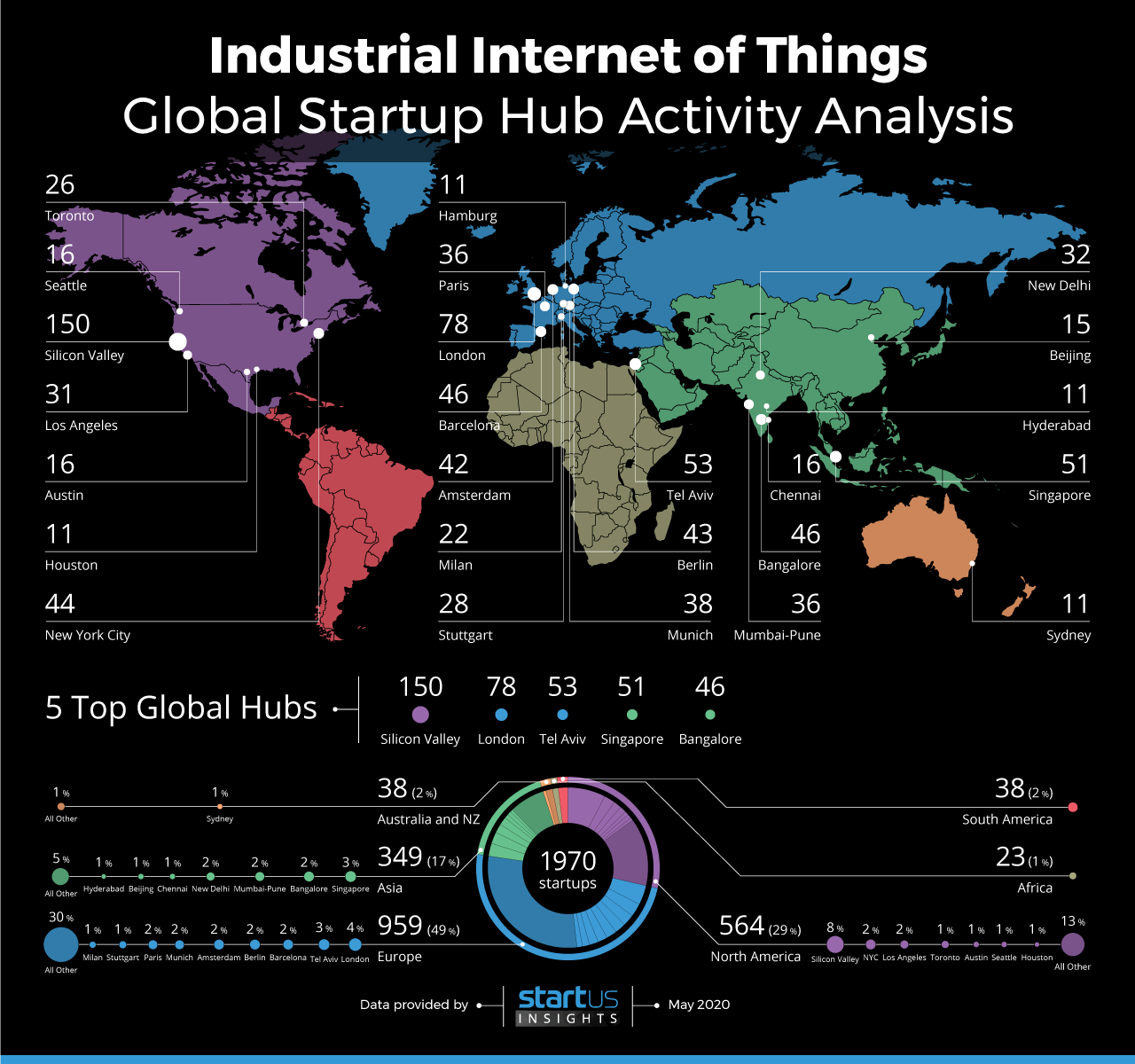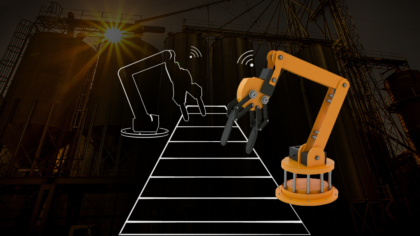Accelerate Productivity in 2025
Reignite Growth Despite the Global Slowdown
Factories and manufacturing facilities around the world observe significant benefits of digitization. To achieve this, smart factory and industry 4.0 applications depend on the underlying technology – the industrial internet of things. For example, by employing edge and fog computing, a range of sensors and a growing number of autonomous robots within a factory floor communicate and execute tasks. Moreover, the IIoT allows production units to improve efficiency by eventually enabling predictive maintenance and ‘lights-off’ manufacturing.
Top 5 Global Industrial Internet of Things Startup Hubs
Using our StartUs Insights Platform covering more than 1.116.000 startups & emerging companies, we analyzed the geographic distribution of global activity in Industry 4.0. We identified 25 regional hubs* that observe high activity in developing industrial internet of things (IIoT) solutions across factories and manufacturing facilities.
For this research, we analyzed 1.970 startups and observe that Silicon Valley, London, Tel Aviv, Singapore, and Bangalore are home to 378 startups* and account for 19% of global startup activity making these cities the Top 5 Global Industrial Internet of Things Startup Hubs. Let us have a closer look at these cities and some of the promising startups they have put forth.
According to our data, more than three-fourths of the global startup activity occurs in the top 25 industrial internet of things hubs. European leaders like the Netherlands, Germany, and Israel already observe higher industry 4.0 adoption. The USA accounts for almost a third of global startup activity with a large hub in Silicon Valley.
Asian manufacturing also sees a growing number of startups working on IIoT solutions. Singapore and India, along with China, are home to numerous startups helping factories achieve industry 4.0 characteristics. With significant benefits from utilizing IIoT, South America and Africa also show an increasing number of companies when compared to other modern technologies.
#1 Silicon Valley: 150 Startups & Emerging Companies
Over the past decade, Silicon Valley startups have been developing IIoT solutions with the mentality of ‘crawl, walk, run’. From simple integrations and predictive analytics to cybersecurity and predictive maintenance, Silicon Valley companies are making the transition to provide comprehensive IIoT solutions. However, the region is set to face increasing competition from other US hubs that traditionally have higher manufacturing capacities, from Atlanta to San Diego, as well as Alberta in Canada.
Operating from Menlo Park, Corlina is a startup offering tailored industry 4.0 solutions for manufacturing facilities. The startup’s patent-pending TrustMetric platform provides factories with a real-time measure of their data quality and systems stability. By improving data reliability within the factory, the Corlina dashboard enables users to maximize the production outcomes by performing accurate predictive analytics, maintenance, as well as complex system integrations.
#2 London: 78 Startups & Emerging Companies
Early in 2020, the UK government released a set of regulations that intend to protect IoT data, especially consumer-facing devices and products. The UK already identifies the industrial internet of things as one of the key enabling technologies in their “Innovate UK” agenda. All this results in emerging companies developing solutions within the limits of data security while simultaneously improving consumer trust for connected devices.
London-based startup Dashboard offers condition-based maintenance for oil & gas, mining, utilities, and other infrastructure. The company utilizes the industrial IoT to collect data and employ advanced analytics techniques to provide targeted preventive and predictive maintenance. Dashboard’s approach also incorporates bespoke process mapping and machine learning in order to improve the accuracy of the condition of equipment or infrastructure.
#3 Tel Aviv: 53 Startups & Emerging Companies
Despite having a relatively small and mostly traditional manufacturing sector in the country, Israel is home to numerous startups and emerging companies developing smart factory and related industry 4.0 solutions. The challenges facing technology adoption by Israeli manufacturing are being addressed by the government, as well as by foreign investors, who have seen significant progress with the country’s automotive startups.
Based out of Netanya in Israel, Core Tigo develops the IO-Link Wireless standards-based industrial connectivity platform. The startup’s range of wireless products is designed specifically to enable factory digitization. Actuators and batteries are embedded with wireless IO-Link technology to automate numerous industrial robotic processes. The products ensure low-latency and allow for up to 40 devices per master sensor, and also reduce cabling and maintenance costs.
#4 Singapore: 51 Startups & Emerging Companies
Singapore is Asia’s largest technology hub for the IIoT and advanced manufacturing. Favorable government policies and subsidies along with increasing public-private partnerships, as well as rising demand from across Asia, all help in the development of industrial automation solutions. Emerging companies address the challenges that concern innovators, such as low initiative from manufacturing units and high costs of implementation.
SixSense is a Singapore-based deep tech startup building an Artificial Intelligence (AI)-powered defect analytics platform for smart manufacturing. The company offers three solutions for enabling factory-level automation. ClassifAI automatically identifies and classifies defects in products. CausifAI scans through factory data to identify defects in equipment or processes. Finally, predictAI is a real-time failure prediction tool for industrial equipment.
#5 Bangalore: 46 Startups & Emerging Companies
One of the biggest information technology (IT) hubs in the world, Bangalore houses some of India’s best innovations. In 2015, the Indian government established a number of centers of excellence across the country, including Bangalore. Aiming to combine existing IT expertise with emerging operating technologies (OT) and hardware, Bangalore offers startups numerous opportunities for developing smart IIoT manufacturing solutions.
Bangalore-based startup LivNSense creates iSense4i, a comprehensive industrial internet of things platform. This cloud-agnostic platform utilizes several emerging technologies, such as microservices architecture, secured containers, as well as AI and machine learning models, among others. It gathers data from multiple sources like storage, cameras, sensors, actuators, and data files. Consequently, the platform supports factory applications in the form of smart welding and predictive quality inspections.
What’s Next?
As demand for goods and services continues to rise, industrial automation and smart factories will play a key role in ensuring supply, while keeping costs at a low level. Startups work on advanced sensors, sensor fusion, and sensor data collection solutions that allow even traditional and labor-intensive production facilities to employ some form of digitization. Across the world, smart manufacturing and IIoT is already in use. As technology permeates through more industries and observes increased adoption rates, it is expected that the number of emerging companies will also rise.
*A hub is defined as the regional geographic center of activity for this topic. It covers the center point with a radius of 100 km (62 mi). We define startups & emerging companies as those founded after 2010.









